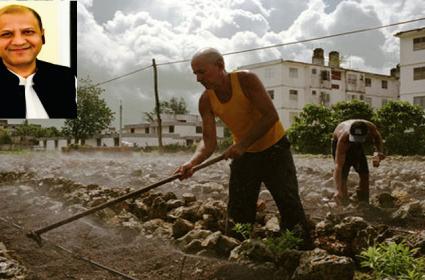Unbalanced Growth Is Chronic And Bad Economics

Allotment is an input. Impact from the input is ignored. Let’s face it. The Government focuses on allotment.
India has over 1000 ‘schemes’ for the poor, leakage is rampant and woeful. It is time that we set up a mechanism through a specialized and focused institution to enhance the output. This could be done by spending about 1% of the outlay. The budget was a good opportunity to set up a fund for an institution that is ‘accountable for impact’. Better implementation targets growth holistically.
Farmers are distressed and Rural India is excluded
The government’s ‘conscious’ effort to double farmers' income is laudable. The FM is underlining that goal by providing a ‘guaranteed’ support price. ‘Ensuring’ a minimum price for the produce is the only way to pull the farmers out of the hole. Rewarding the output is more equable and fair than subsidizing the input.
However, this is half done. The government must create an agri ecosystem by developing an effective ‘backward and forward’ linkage to ‘transition’ a farmer to an agri-entrepreneur.
India’s rural problem is so deftly intertwined that finding a solution means addressing other challenges. Most policy makers and many others believe India's rural economy is agriculture. Agriculture is the fulcrum of rural Indian economy but two third of rural economy is non-agricultural activities. Agricultural outlays do move the needle in rural India, but just that. Rural India has mountains to climb.
Focus on creating an industrial ecosystem
The budget has tried to incentivize job creation by contributing to EPF of new employment. This welcome but is half baked. These artificial inducements are administratively difficult to monitor and leads to leakage. Industry will not ‘employ’ just because it gets subsidies.
The focus must be in the creation of an enabling industrial ecosystem that will lead to job creation. There is a serious shortage skill, talent and technical experts. Infrastructure is the big elephant in the room, and our MSMEs operate in a very ‘hostile’ environment and against the unfavorable headwind and bureaucratic hurdles. This only makes our industry less competitive.
Self employment is not sustainable
The finance minister has provided yet another generous outlay under the mudra scheme. This is good news. However the government must focus on creating a more enabling environment for entrepreneurs. We still seem to be living in a ‘scarcity mindset’. Our research indicates that funding is no longer the big challenge. With the advent of the NBFCs and several other avenues opened, the key to small entrepreneurship is an enabling environment. Budget is not the occasion to address this as this is a continuous process. I would have liked to see this being addressed through a more robust and in a holistic manner (funding, skill development, handholding ‘to market’ etc). Setting up an institution that cradles and nourishes the sector could be a good start.
Health Coverage is a good start; follow with care
Medical reimbursement per family annually is truly heartening and has given hopes to the millions for a healthy life. It is a good start. Keeping in mind that the government spends less than 2 % of GDP on health sector, this ‘healthy’ outlay will provide the much needed balm. It will support in the inept National Rural, which is so disengaged from the poor.
However healthcare programme coverage is not the same as the health. Coverage only provides financial resources and security.
It is the health delivery infrastructure, both soft and hard that will keep people healthy. The demand side must be strengthened by reforming our emancipated public heath framework which is detached from the larger context in which health services should be delivered.
National Rural Livelihood Mission has failed to deliver. The government’s ‘investment’ in rural skill development, is a good cause badly implemented. In its present form neither will it help in creating employment not will it support livelihood initiative .A robust yet innovative framework will need to be designed and a more intensive and impactful implementation mechanism needs to be created.
Investing in talent and skill development should be the first step. To ensure universal health focus must be on rural India where the pain and distress is.
The government can both incentivize and reward the medical fraternity especially the medical practitioner to invest and serve rural India.
The Government must not go the Right to Education Act way and learn from its failure. All the money spent on ‘schooling’ has not been able to ‘educate’ our children. Medical education and talent development must not go the same way.
Universal Income
I am very disappointed to see no meaningful mention of Uniform Basic Income. A back of the envelope calculation clearly indicates Uniform Basic Income for the poorest of the poor may not be beyond the reach of our society. India has over 1000 ‘schemes’ for the poor, ‘spending’ over 6 % of the GDP. Leakage is rampant and woeful.
The choice is basically between an inefficient subsidy regime and efficient cash transfers (Uniform Basic Income).
The concept, however far-fetched is gaining an appeal. The chief economic adviser devoted some bandwidth to create awareness and provide direction. Some want to ‘experiment’ this in a few states. A better and a more impactful outcome may be to create a robust framework and start this in the poorest districts across India rather than ‘try’ this out in some states.
UBI ,if implemented well will help in providing a life of dignity to over 65 % of the Indians, excluded and abandoned.
Dr. Vikas Singh
President Crux Management




















